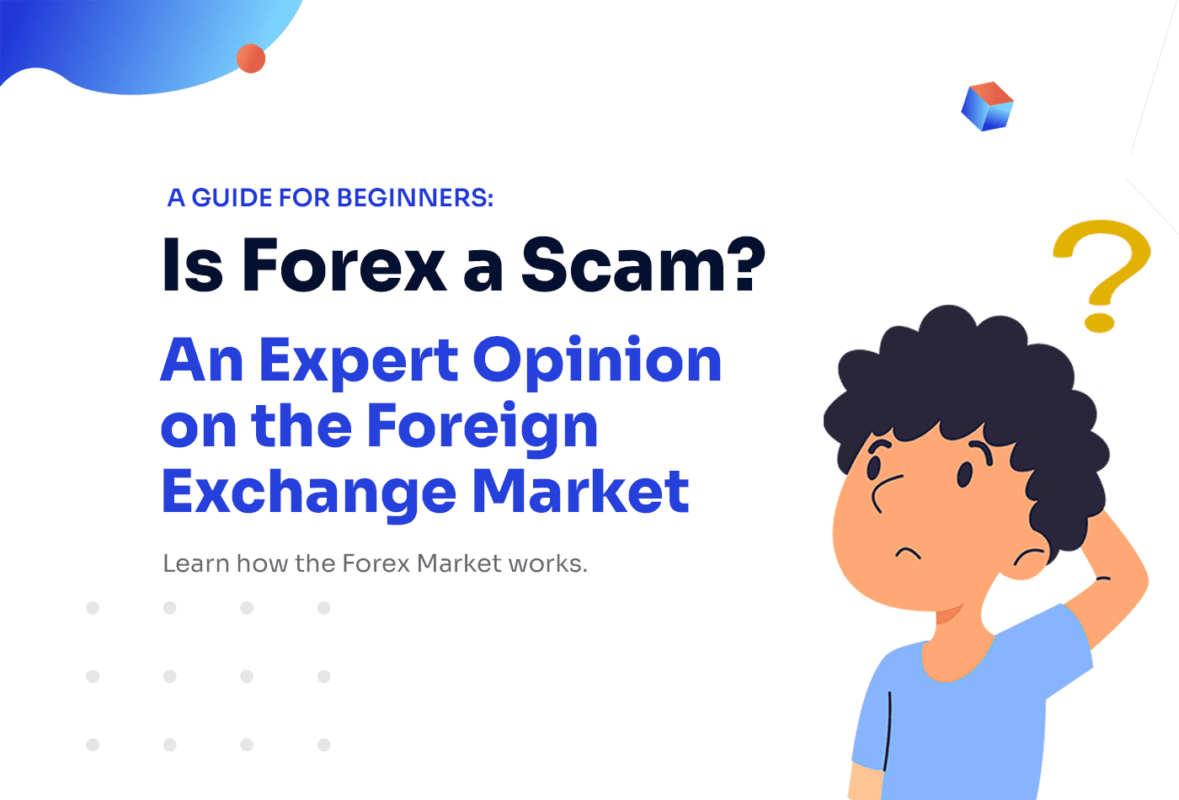No products in the cart.
Motivation
Is Forex Legit? An Expert Opinion on the Forex Market
The foreign exchange (Forex) market is a large and profitable one. In 2010, the forex market recorded over $4 trillion in daily turnover. Many investors have found great success trading on it, and currencies have quickly become one of the most widely preferred assets to invest in. However, before you jump into this possibly new avenue for investing, there are a few things that you should know. One of the main concerns of people that are starting out is to find out one simple thing – is forex legit?
In general, the forex market is much less regulated than the stock market. This has resulted in many cases of fraud and scam brokers popping up. Forex is a much more treacherous field where one has to watch out for malicious actors and fraudsters. Today, we are looking at what to search for in a forex broker and how to identify scams.
What Is Forex?
The Foreign Exchange Market, or Forex for short, is an international market where fiat currencies can be traded. Each one’s price is quoted in relation to another’s. As such, listings of currencies come in pairs. For example, USD/EUR is the price of the US dollar when compared to that of the euro. If this is listed as 0.89, it would mean that it costs $1 to buy €0.89. If this price falls, it means that the value of
Meanwhile, in forex, you can make trades in micro, mini, and standard lots. The first of these consists of 1,000 units of a currency, while the second is 10,000 units and the standard is 100,000 units. However, as these are quite large for smaller and retail traders, they can use what is known as a pip. A pip (percentage in price) is the smallest move you can make on a forex-based market. One pip constitutes one one-hundredth of 1% (1% of 1%). Newcomers will usually trade in pips of micro-lots, which in dollars would come to $0.10 per trade.
Since on the forex market, listings come in pairs, it means that when you are selling one currency, you are doing so against another one. In effect, you are trading the two. Traders make money by getting a currency at one price and selling it at a higher one. As a result, for someone to make a profit on the forex market, someone else has to lose.
How Does Forex Trading Work?
As mentioned, investors in the forex market will trade pairs of currencies. They buy and sell these based on their prediction of how prices will fluctuate. As such, they fall under the category of speculators. Since there is no underlying company or organization behind currencies, you cannot evaluate them based on their fundamentals. Instead, they are affected by global politics, the price of related assets, and the supply and demand on the market.
Since forex trading requires significant investments, most investors will operate using margin accounts. This means that only a small part of their investment actually consists of their own money, which they provide upfront. Meanwhile, the broker supplies the rest. In the world of legit forex, brokers can grant margins up to 50:1. This allows smaller traders to make much larger moves than they would otherwise be able to.
While many associate margin trading with higher risks, these are significantly reduced on the forex market. Even if you have opened a position with significant leverage, the possibility of stable currencies like the dollar or the euro drastically decreasing in value is virtually nill. While there is still a possibility of losing money, your position won’t go completely bust.
Is Forex Legit?
The forex market is a legitimate marketplace for trading currencies. It is integral to the current state of international trade. Without it, it would be impossible to easily and quickly acquire the currencies needed to import and export goods or conduct business on a global level. It has also become a genuine trading avenue in its own right, easily surpassing the older and more well-established stock market in both size and value.
However, due to its decentralized nature, the forex market does open up the possibility of scams and fraud. While there are regulators that monitor brokers and ensure the enforcement of rules, they are not a requirement. Overseas platforms can operate from countries with light regulation or even without a license. As a result, you might sometimes run into bad actors who have made some investors question how legit the forex market is. This is why you should always do your research into the broker you are choosing and make sure that it is properly regulated.
Common Forex Scams And Malpractices
There are various ways that brokers can take advantage of their customers and cheat them or use privileged information to profit at their expense. Here are some red flags that you should be on the lookout for when picking a legit forex broker or trading on the market.
Front-Running
Front-running occurs when a broker uses inside information from clients’ orders to make their own trades. By doing so, they can get ahead of big fluctuations and capitalize on confidential information not available to the general public. This creates a conflict of interests and can even be harmful to the broker’s clients.
Stop-Hunting
Stop-hunting is the practice of driving the value of assets to a point where investors believe many stop-loss orders will be triggered. When this occurs, traders can take advantage of the reduced price and many open sell orders to buy up assets. The aim is to capitalize on a potential upswing or even trigger a bull run on the price. While this is a legitimate trading strategy, brokers can use inside information on customer stop-loss orders and exploit it for their profit.
Signal-Seller Scams
Signal-sellar scams involve groups of people or organizations that charge monthly or other regular subscription fees. In return, they promise to provide you with industry insight and information on trades that are a “sure thing.” They will often claim that they have extensive experience and great success in the market or inside information. Reviews and testimonials from supposed satisfied customers will also be provided in most cases. In reality, these “specialists” will provide you with nothing more than their own predictions without any actual support from facts or statistics.
Churning
Churning is another practice in which brokers take advantage of their position. However, in this case, brokers who manage clients’ investment accounts will make an excessive number of trades. While the transactions themselves might be profitable, the commission fees and taxes can quickly rack up. The result is a negative outcome for the client who ends up losing money. Meanwhile, the broker has profited from the commissions.
Robot Scams
Robot scams are another instance of false promises to look out for. Like signal-sellers, robot scams promise information on “sure deals” and guaranteed profits. However, in this case, they claim to be using algorithms that can accurately predict movements on the market. Although such automated systems do exist, they require significant testing and close examination of the underlying algorithms and parameters. Most scam robots have never been tested and in reality, simply make random trades.
Commonly Traded Currencies
In the world of legit forex, currencies fall under one of two categories- major and minor. Only ten currencies make up the major division. These are part of the so-called G10 and include the British pound, the Swiss franc, the Canadian dollar, the Japanese yen, the euro, the Australian dollar, the New Zealand dollar, the Swedish krona, the Norwegian krone, and the Danish krone. Of these, EUR/USD, USD/JPY, GBP/USD, and USD/CHF are the primary four pairs. The first pair alone constitutes over 23% of all positions on the market. Overall, these pairs make up most of the executed trades on the forex market. Both new and experienced traders prefer major currencies due to their lower volatility and higher predictability.
Meanwhile, minor currencies are all other currencies available to trade. These are more popular among experienced traders for their higher potential for profits. Although riskier, seasoned forex traders can leverage the unstable prices of minor currencies and their own knowledge to determine positive outcomes. However, due to the low volume, the bid-ask spread will be more significant.
What Is A Legit Forex Broker?
Forex brokers are financial services that facilitate transactions between traders in the market. They provide customers with access to a trading platform around the clock, as the forex market is open 24/7. Your choice of forex broker is, perhaps, the most important factor when starting to trade on this market. As such, you should do extensive research into a broker’s background, reputation, and track record in order to select a legit forex broker. A platform’s regulator is also critical, as this is a good way to determine if it is trustworthy.
There are several ways that brokers make money, all of which should affect your choice when picking one.
- Commission fees are a common way for financial brokers to make money from facilitating trades. This is also the simplest and most widely understood method. Whenever you open or close a position, a small percentage fee will be tacked onto the final price. However, since forex is an extremely competitive market, most brokers are eliminating commission fees to attract customers.
- The bid-ask spread is the most popular way for forex brokers to capitalize on customer trades. This is due to the way that transactions work on the market. Since there is a difference between the price at the time you place your order and the time the broker executes it, you will likely end up paying more. Brokers will often add a small margin to this spread in order to make a profit.
- Trading is also something that some brokers will do for themselves. In such cases, the company will use its position in the market to make informed decisions. However, this can often become a conflict of interests as these moves can be determined to be against those of the platform’s customers. As a result, this practice has decreased over the past several years due to increasing regulation.
What Are Legit Forex Regulators?
Since the forex market is a global exchange with no central institution, it operates as a decentralized network. This makes it much less regulated than other financial markets and more prone to cases of fraud. However, most countries will have regulatory bodies that monitor brokers operating within their jurisdictions and make sure that a legit forex market is maintained. They will keep track of companies and ensure that they follow specific guidelines. These include:
- Division of client funds. A broker should not have access to client funds for personal use such as operational expenses. Instead, brokers must keep client funds in a separate account, meant exclusively for that purpose.
- Investor protection is required for brokers to be approved for operation. This ensures that in the event that the company goes under, it will have sufficient funds to repay customer deposits.
- Disclosure requires brokers to inform clients of the potential risks of forex trading, as well as the constant state of their accounts.
- Leverage caps are also imposed on brokers. These make sure that they do not give customers excessive leverage ratios that can be damaging or abused.
- Regular audits are a way for regulators to keep track of brokers’ status and make sure that everything is working as intended.
- Brokers’ conduct also falls under the jurisdiction of regulators. They make sure that brokers do not advertise false claims or make unrealistic promises. They also monitor for conflicts of interest and potential moves against customers.
While many countries have their own regulatory bodies, not all of them carry the same weight. In general, there are several highly regarded ones that can serve as a certificate of quality. Seeing any one of these on a broker’s website is widely considered to be a good sign. Below we have listed the most trusted regulators in the legit forex trading field.
The National Futures Association (NFA)
The NFA is the main regulatory body in the United States. Established in 1982, this self-governing organization oversees the derivatives market in the US. The association is completely independent and sustained itself via membership fees paid by licensees. A license from the NFA is required for any organization wishing to participate in the US market.
The NFA closely monitors all licensees through regular audits and reports and imposes limits on their operations. For instance, the maximum leverage for G10 currency positions is 50:1, while for all other ones it is 20:1. The NFA also requires that all licensed brokers enforce the “first-in, first-out” rule. What this means is that traders have to sell positions in the order that they bought them in if they are related to the same currency pair.
The Financial Conduct Authorit (FCA)
The FCA is the United Kingdom’s regulatory body when it comes to customer-focused financial services. Again, this organization is independent of the government and operates by charging fees for licensing. The FCA was founded in 2013 alongside the PRA as successors of the Financial Services Authority that had existed beforehand.
The leverage limit for G10 currencies under FCA regulation is 30:1. Meanwhile, the cap for minor currencies is 20:1.
Australian Securities and Investments Commission (ASIC)
The ASIC is an independent commission tasked with regulating companies and financial services. Like its overseas counterparts, it is fully autonomous from the government and operates through license fees. Like with the FCA, ASIC limits forex leverage to 30:1 for major currencies and 20:1 for minor ones.
The ASIC’s jurisdiction also extends to companies, banks, financial services, financial markets, mortgage brokers, credit unions, and more. As such, the commission also acts as a national regulator and advises the Minister on matters of emerging markets.
Swiss Financial Market Supervisory Authority (FINMA)
The FINMA is a relatively young regulator in the world of legit forex. Founded in 2007, it serves as the regulatory body for Switzerland. It oversees banks, stock markets, insurance companies, and various other financial institutions. While independent, FINMA reports to the Swiss parliament and is also responsible for combating money laundering in the country.
Financial Services Agency (FSA)
Japan is a very important entity in the forex market. As part of the second most traded pair, the Japanese yen is highly valued for its low interest rates. Traders will often borrow it to purchase other currencies, resulting in high trading volumes. The FSA was formed in 2000 to monitor and govern the country’s banking, insurance, exchange, and private financial sectors. Unlike other popular regulators, the FSA is a government entity and reports to the Minister of State for Financial Services.
Selecting A Legit Forex Broker
Selecting the right broker is arguably the most important decision you will make in your forex career. This will give you your foundation for all future trades, and starting off on the wrong foot can cost you a lot of money later down the line. While switching brokers is possible, it can be a costly and time-consuming endeavor. This is especially true if you have deposited a lot of money on your current platform. As a result, here are some of the most important features that you should look for when choosing a forex broker.
Legit Forex Regulators
Regulators are one of the most important factors to consider. They will give you a good general idea as to how trustworthy a broker is. If a platform is licensed by several of the more credible regulatory bodies, that should generally mean that it is safe.
Legit Forex Trading Platforms
The trading platform is what you will be using to conduct all of your transactions. This is your gateway to the market. You should make sure that it is easy to use and has an intuitive UI. If you are an experienced trader, make sure that it has a good number of tools for you to use. These will provide you with important data that you can use to your advantage. If you are newer, make sure that the platform is simple and easy to learn.
Currency Pairs
Available currency pairs are crucial for forex traders. Since this is what you will actually be buying and selling, a wide selection of pairs will allow you to make varied trades. At the very least, you should make sure that the broker offers the 10 major currencies and their pairs.
Legit Forex Services
The financial services offered by the broker are also very important. These will give you the versatility to make different moves and maximize potential profits. Margins, leverage limits, spreads, and more are all handy tools that you can use to make the most of your investments. Make sure that they are set in your favor.
Execution Speed
Execution speed is the period between the time at which you open an order and the time when the broker fulfills it. As this increases, so does the amount of slippage that occurs. Slippage is the difference in price between the price that you expect to pay and the actual price paid at the time of the order execution. Make sure that your broker has a fast execution speed to minimize slippage in times of volatility.
Fees And Limits
Fees and minimum transaction requirements are other things to look out for. High minimum deposit and withdrawal requirements can make it hard for many to move their funds. Meanwhile, high commission fees can quickly add up if you are an active trader. Meanwhile, brokers that offer 0% commissions make money in other ways, so be mindful of that. In most cases, they will sell your data or receive payment for order flow.
Top Legit Forex Brokers
Interactive Brokers
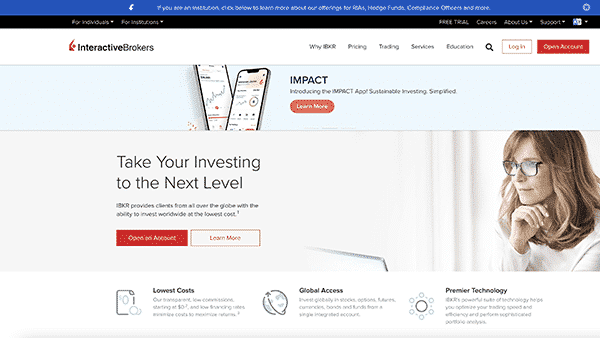
Founded in 1977, Interactive Brokers is one of the oldest and most trusted names in the trading world. During its many years in the industry, the broker has been the first to adopt many innovative technologies and has been the first to adopt multiple practices. Today, its online platform offers trading services for various assets, including currencies. Traders can utilize a number of professional-grade tools to navigate over 125 market centers.
The broker is licensed by six highly-regarded regulators, among which are the SEC, FINRA, ASIC, IIORC, and others. With such a reputation, it is definitely one of the most legit forex brokers out there.
Saxo Bank
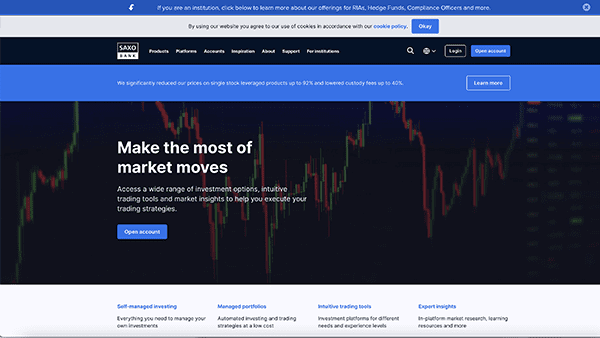
Saxo Bank is another excellent option when it comes to more professional platforms. It offers over 40,000 instruments that customers can trade, including forex pairs and CFDs. Saxo Bank also operates under numerous regulators, including the FCA, ASIC, FINMA, and more. The platform also has an excellent customer experience with reliable support provided at all times and tight spreads. However, this premium experience does come at a price, as Saxo Bank has a minimum deposit set at $10,000. As this will be a steep entry fee for most casual traders, the platform is definitely aimed at professionals.
eToro
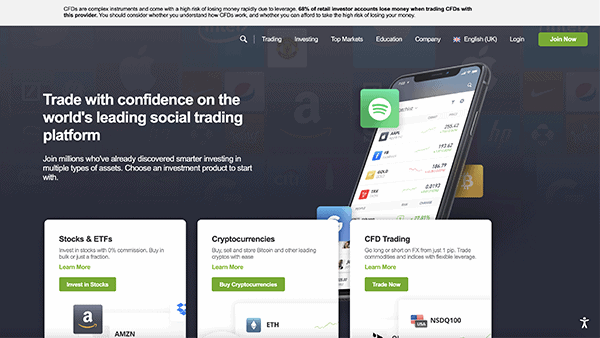
eToro is perhaps the most popular online trading platform. It allows users to trade everything from stocks to cryptocurrencies. Fiat currencies are also available on the marketplace. What has made eToro so popular are its simplicity and ease of use. Investors are able to set up accounts and start trading within a matter of minutes. The minimum deposit is also much lower than most standard online brokers. In most countries, customers need to deposit as little as $50 to get started. EToro also offers an excellent copy trading system that allows learners to copy the trading moves of more experienced investors.
However, eToro does come with some caveats. Since the platform charges 0% commission fees, it does receive payment for order flow from third parties. Furthermore, liquidity is sometimes an issue with such platforms. As exemplified during the GameStop short squeeze of 2021, the platform was unable to execute all orders. As a result, eToro stopped all trades of the GME stock on their exchange until the situation calmed down. This meant that many were unable to exit their positions and potentially lost money. There have been multiple such instances of frozen assets on the platform since then.
IG

IG is another broker with a longstanding history in the industry. Founded in 1974, this London-based broker started out as a gold trading index on the British exchange. Since then, it has expanded into providing online trading tools for multiple markets. You can choose from a wide selection of nearly 20,000 different instruments on the platform, including various currency pairs. Minimum deposits on IG depend on your payment method and account type but generally start at about $250.
For active forex day traders, the platform offers Forex Direct accounts. These have a higher minimum deposit of $1,000 but offer lower commissions and tighter spreads. The option gives you access to the L2 Dealer, where you can trade CFDs straight from the order book.
IG is also highly regulated and licensed by the FCA, BaFin, ASIC, CySec, FINMA, CFTC, JFSA, and other highly-respected bodies.
TD Ameritrade
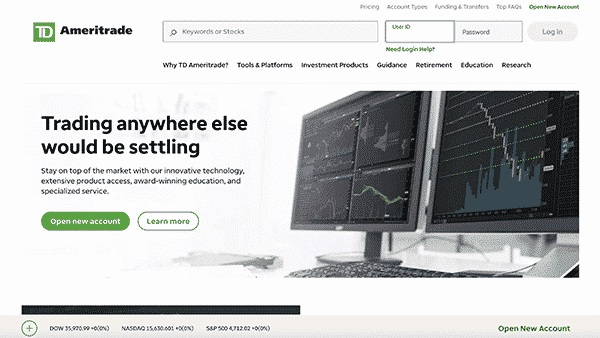
TD Ameritrade is a US-focused broker. Initially founded simply as Ameritrade in 1971, the company has grown over the years and was most recently acquired by the Charles Schwab Corporation in 2020. Nowadays, it facilitates the trade of various financial assets, including forex, commodities, crypto, stocks, futures, and more. However, it is only available to customers from the United States and a handful of other countries. Those who can access its services will enjoy a total of 73 forex pairs, tradable on a professional and intuitive platform. The broker offers 0% commission fees on US stock trades, which can be very attractive for new customers. It also does not have a minimum deposit amount which only increases its accessibility.
The company acquires revenue from trade commissions and interest on margin transactions. However, it also receives payment for order flow from third parties. This latter one is how the platform can offer the aforementioned 0% commissions.
TD Ameritrade is another tried and true broker that is licensed by several highly-regarded authorities. These include the SEC, FINRA, the CFTC, and others.
Conclusion
In conclusion, the Forex market is a completely legitimate financial marketplace that stands on the same ground as the stock exchange. Over the fifty or so years that it has existed in its current state, the forex market has become one of the cornerstones of the financial world. It allows institutions and individuals to trade large quantities of currencies quickly and easily. This, in turn, has eased the globalization of business.
Many traders have found the legit forex market to be an excellent avenue for investment and make it their career to learn how to profit off of it. Whether you are looking to deal in spot trades or bet on FX futures, the forex market allows you to invest in currencies from all over the world. However, due to its decentralized nature, it does hold some risks that you should be mindful of. As such, make sure to follow the steps outlined in this guide and remain vigilant for possible scams.
Source link

